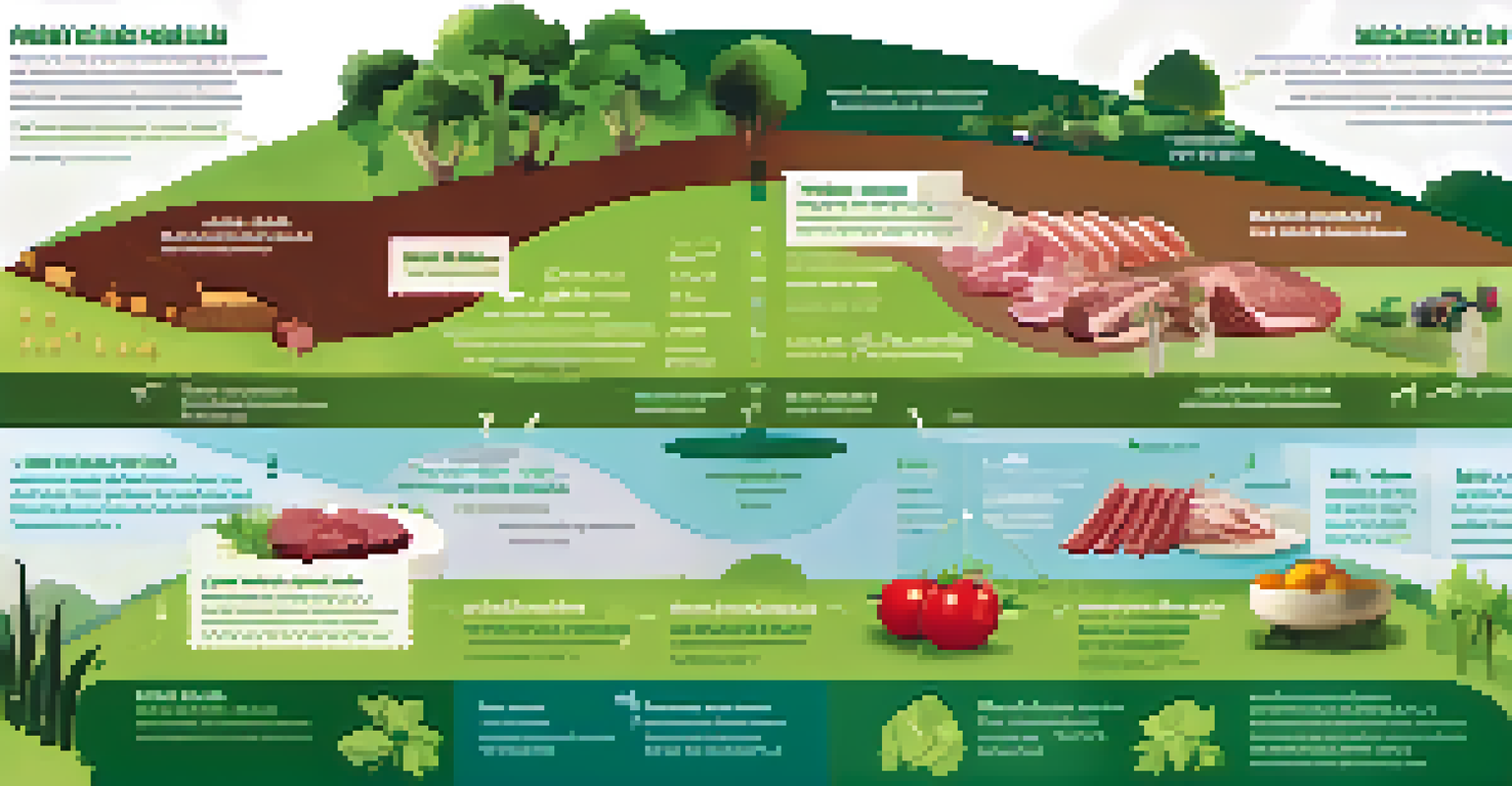Health Economics: Cost-Effectiveness of Vegetarian Meals

Understanding Health Economics in Diet Choices
Health economics is a field that evaluates the efficiency and value of healthcare resources, including dietary choices. When considering vegetarian meals, it’s essential to analyze not just health outcomes but also economic impacts. A well-balanced vegetarian diet can reduce healthcare costs by promoting better health and preventing chronic diseases.
Let food be thy medicine and medicine be thy food.
For example, research indicates that diets rich in plant-based foods can lower the risk of heart disease and diabetes, leading to fewer medical expenses. This highlights how health economics encompasses both individual health and broader societal costs. Understanding these connections can help consumers make more informed dietary choices.
Ultimately, health economics encourages us to think about the long-term implications of our food choices, not just in terms of taste but also in cost and health outcomes. By examining how vegetarian meals fit into this framework, we can appreciate their potential benefits on both personal and public health levels.
Cost-Effectiveness of Vegetarian Meals
When we talk about cost-effectiveness, we refer to the benefits gained relative to the costs incurred. Vegetarian meals often present a more affordable option compared to meat-based diets, especially when considering the price of high-quality proteins. Staples like beans, lentils, and grains typically cost less than meat, making them budget-friendly alternatives.

Additionally, studies have shown that incorporating more plant-based meals into one’s diet can lead to lower healthcare costs over time. For instance, individuals who maintain a vegetarian diet may experience fewer health issues, resulting in less spending on medications and doctor visits. This creates a compelling case for the economic advantages of vegetarianism.
Cost Savings with Vegetarian Meals
A vegetarian diet can lead to long-term healthcare savings by reducing the risk of chronic diseases.
By assessing both the direct costs of buying groceries and the indirect costs related to health, we see that vegetarian meals can be a smart financial choice. The cumulative savings over time, combined with improved health outcomes, illustrate the cost-effectiveness of choosing plant-based options.
Environmental Impact and Economic Benefits
The environmental impact of food choices is another crucial aspect of health economics. The production of meat is resource-intensive, requiring significant amounts of water, land, and energy. In contrast, vegetarian meals typically have a smaller ecological footprint, which can translate into long-term economic savings through reduced resource depletion.
The greatest wealth is health.
Moreover, sustainable food practices can help mitigate climate change, which is projected to have substantial economic repercussions globally. By shifting towards a more plant-based diet, we not only promote personal health but also contribute to a healthier planet—ultimately reducing costs associated with environmental degradation.
This connection between dietary choices and environmental economics underscores the importance of considering how our food impacts both our wallets and the world. Choosing vegetarian meals can thus be viewed as a dual investment: in our health and the health of our environment.
Health Benefits of Vegetarian Diets
The health benefits of vegetarian diets are well-documented, contributing to their cost-effectiveness. Diets rich in fruits, vegetables, whole grains, and legumes are linked to lower rates of obesity, hypertension, and certain cancers. These health advantages not only enhance quality of life but also reduce the long-term costs of healthcare.
For example, a study published by the American Journal of Clinical Nutrition found that vegetarians tend to have lower body mass indexes (BMIs) compared to meat-eaters. This reduction in BMI is associated with lower healthcare costs due to decreased risk of chronic diseases. Hence, healthier individuals translate to less strain on healthcare systems.
Environmental Benefits of Diet
Choosing plant-based meals contributes to a smaller ecological footprint and supports sustainable resource use.
These health benefits reinforce the idea that investing in vegetarian meals is not just a dietary choice; it’s a proactive step towards maintaining overall health and managing future costs. By prioritizing plant-based foods, individuals can cultivate a healthier lifestyle while simultaneously addressing economic concerns.
Cultural Perspectives on Vegetarianism
Cultural attitudes toward vegetarianism can significantly impact its acceptance and implementation. In many cultures, plant-based diets are not only traditional but also celebrated for their health benefits. Understanding these cultural perspectives can enhance the effectiveness of promoting vegetarian meals as a cost-effective option.
For example, in countries where vegetarianism is prevalent, such as India, the economic benefits of plant-based eating are deeply embedded in the culture. This cultural acceptance often leads to lower prices for vegetarian staples, making them more accessible to the population. Recognizing these dynamics can help tailor public health messages to resonate with diverse communities.
Incorporating cultural narratives into discussions about vegetarianism can foster greater acceptance and understanding. By highlighting how various cultures embrace plant-based meals, we can encourage more people to consider the economic and health benefits of adopting a vegetarian lifestyle.
Challenges to Adopting Vegetarian Diets
Despite the numerous benefits, there are challenges when it comes to adopting a vegetarian diet. Some individuals may find it difficult to change longstanding eating habits, while others may lack access to affordable vegetarian options. This can create barriers that prevent people from experiencing the cost-effectiveness of plant-based meals.
Moreover, misconceptions about vegetarian diets, such as the belief that they are lacking in protein or essential nutrients, can deter individuals from making the switch. Education plays a crucial role in overcoming these challenges by providing accurate information about nutrition and the benefits of vegetarianism.
Cultural Acceptance of Vegetarianism
Cultural perspectives on vegetarianism can influence its adoption, highlighting the economic benefits within various communities.
Addressing these challenges requires a multifaceted approach, including community outreach and educational programs that emphasize the affordability and health advantages of vegetarian meals. By making vegetarian options more accessible and appealing, we can promote a shift towards healthier, cost-effective eating habits.
Future of Vegetarian Meals in Health Economics
Looking ahead, the role of vegetarian meals in health economics is poised to expand. As awareness of health issues and environmental concerns grows, more consumers are considering plant-based diets. This trend is likely to influence market dynamics, leading to increased demand for vegetarian products and greater investment in plant-based food innovations.
Governments and organizations may also recognize the economic benefits of promoting vegetarian diets, resulting in policies that support sustainable agriculture and public health initiatives. Such measures could further enhance the cost-effectiveness of vegetarian meals, making them more accessible to the broader population.

Ultimately, the future of vegetarian meals in health economics appears promising. By continuing to explore and advocate for the benefits of plant-based diets, we can pave the way for healthier individuals, a more sustainable environment, and a more efficient healthcare system.